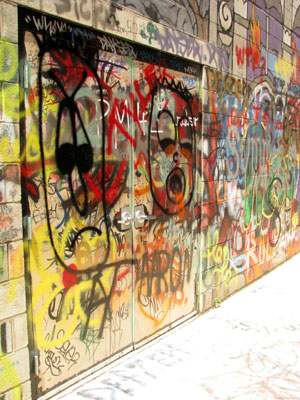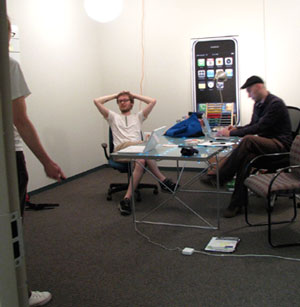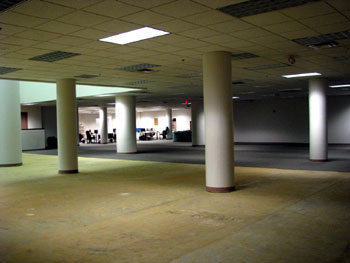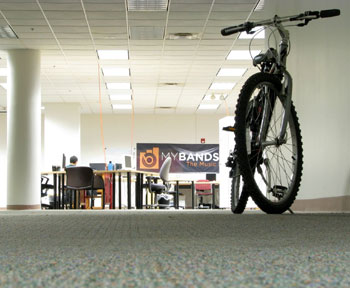Subterranean Start-ups

The TechArb offices are accessible via a graffiti covered door in the alley next to the Michigan Theater. (Photo by the writer.)
Behind a graffiti-covered door, at the end of the alley next to the Michigan Theater and one floor below street level, a handful of entrepreneurs are working at all hours in some pretty unusual office space.
Under the umbrella of TechArb, a coworking space for University of Michigan students, 10 start-up technology companies have set up shop in 30,000 square feet of commercial basement space that has been vacant for years. With 18-foot ceilings, imposing columns and no natural light, there is feeling of total isolation from the hubbub of Liberty Street, just one story up. The seclusion allows the 30 entrepreneurs to focus intensely on building their businesses.
They’re hard at work because the clock is ticking. They’ve got the rent-free space for this summer, and this summer only.
First, a little bit about the space: Tally Hall, the massive structure housing these young businesses, is actually made up of two buildings built in 1984. The taller building, known as Liberty Square, is a six-story parking structure owned by the city of Ann Arbor. The shorter building comprises two floors of office space owned and managed by McKinley Inc. since 2007. With entrances to the ground level from two different streets and a full basement, the building takes on several identities. The University of Michigan’s English Language Institute currently leases the first floor on the Washington Street side, and the Liberty side is under redevelopment for retail use, according to Frances Todoro Hargreaves, property manager for McKinley.
The building was originally developed by the city of Ann Arbor as a public/private partnership – the basement was a food court with retail stores on the first floor. Later, Borders had their corporate headquarters located on both the lower level and the first floor. According to Hargreaves, when Borders vacated the property in 1998 to relocate to the south side of town, the property was left vacant until McKinley purchased it in January of 2007.
Since then, the basement – though empty – has served as an occasional hub for start-up activity in Ann Arbor. In the literal shadow of the office building housing Google a half block away, the location enjoys a certain cachet. It was briefly used last summer as the location for StartUp Weekend, a 54-hour event that brought together professionals from the technology and marketing sectors with the goal of building community and launching new companies. For that event, McKinley donated the use of the space.
Like StartUp Weekend, TechArb enjoys free office space courtesy of McKinley. TechArb, which has no affiliation with Start-Up Weekend, came by the space in a circuitous way.
To understand how TechArb ended up with 30,000 square feet of prime downtown office space for free, we start with UM’s RPM-10 program. RPM-10 is an entrepreneur internship program sponsored by the University of Michigan College of Engineering Center for Entrepreneurship and RPM Ventures, an early-stage technology venture capital firm. Now in its second year, the program provides a summer’s worth of funding, mentorship and office space to UM student entrepreneurs. The program lasts approximately 10 weeks – that’s the “10″ in the name – and is highly competitive. This year, only three companies were accepted out of 35 that applied.
The two founders of RPM Ventures, Marc Weiser and Tony Grover, are both UM College of Engineering alums with strong ties to Ann Arbor. Weiser also has strong ties to McKinley – he’s the son of McKinley founder Ron Weiser, and sits on the Ann Arbor firm’s board of directors. He’s also a board member for the College of Engineering’s Center for Entrepreneurship.
Weiser and Grover started RPM-10 as a way to nurture more tech companies in Michigan. Program winners are offered a unique opportunity to try out entrepreneurship with a very low cost of failure. As Grover says, “The best way to truly learn what it’s like to be an entrepreneur is to just go out and do it.” While RPM Ventures is in the business of funding upstart companies, they have no claim over the RPM-10 teams. Grover says, “At this point, RPM Ventures hasn’t taken a legal or financial stake in the three RPM-10 teams. There’s always the possibility that RPM Ventures could invest in one of the companies in the future out of our investment fund, so that it could become part of our portfolio.”
McKinley, a sponsor of RPM-10, donates the use of the basement space for the RPM-10 summer program.
So where does TechArb fit in?
Jason Bornhorst, a UM student who participated in the RPM-10 program last year, approached the RPM Ventures team with his idea of establishing a coworking space for student-founded start-ups. They invited him to set up what eventually became TechArb in the basement space that they had procured for RPM-10. Now, the three RPM-10 teams work alongside seven other start-ups founded by students, sharing not only the office, but also ideas and advice. Among some of the projects in development: a public transportation tracking system, a website that allows fans to purchase stock in their favorite bands, and smart-phone applications. [See the full list of start-ups here.]

Jeremy Canfield, left, of Phonagle LLC talks with Matt Burton, who's visiting, and Phonagle co-founder Sergio Mendez in their TechArb office. That's a big iPhone poster leaning against the back wall. (Photo by the writer.)
Smart-phone apps are the focus for Phonagle LLC. Sergio Mendez, a recent graduate of the the U-M School of Information, and his three Phonagle co-founders moved their offices into the Tally Hall basement last month. As one of the RPM-10 program teams, they receive assistance to meet the goal of their first multi-player iPhone game launch by the end of the summer. “We develop social mobile games that embed into your daily life, have real-world location components, and allow you to play and cooperate with friends,” Mendez says.
Mendez found out about the RPM-10 program when a representative gave a talk at the UM School of Information, where he has just completed a master’s degree. He was initially wary of the basement: “I personally had mixed feelings when I first saw the space – this is huge! But after two weeks I realized the advantage of working with different people near you … we collaborate a lot with other groups and bounce ideas, get feedback about designs and technical challenges.” The lack of windows has affected his work habits, in a positive way: “You can spend hours of work down here without realizing if it’s sunny or raining outside. I can concentrate better and get work done.”
For businesses that essentially require only a solid internet connection, a chair and a desk to be fully functional, this sparsely furnished space serves its purpose well. Says Jeremy Canfield, co-founder of Phonagle, “The space lends itself to software and technology. There’s a limitation to what it can provide to people outside of that [industry].” If they weren’t working here, the TechArb and RPM-10 teams would most likely be working from coffee shops or their homes. The general consensus is that everyone benefits from the proximity. Canfield notes that “Cross-pollination results from so many companies in a small space.”
While there is interest in establishing TechArb as a permanent space, for now it’s a four-month experiment. At the end of the summer, the free use of the basement will end, and students will return to working in their apartments and dorm rooms. Many will resume classes and make the transition back to being full-time students. But if this summer’s experiment turns into something more permanent, some might be back next year for more.
For a video produced by UM’s College of Engineering about TechArb, click here.
About the writer: Shannon Riffe is a freelance writer living in Ann Arbor.





